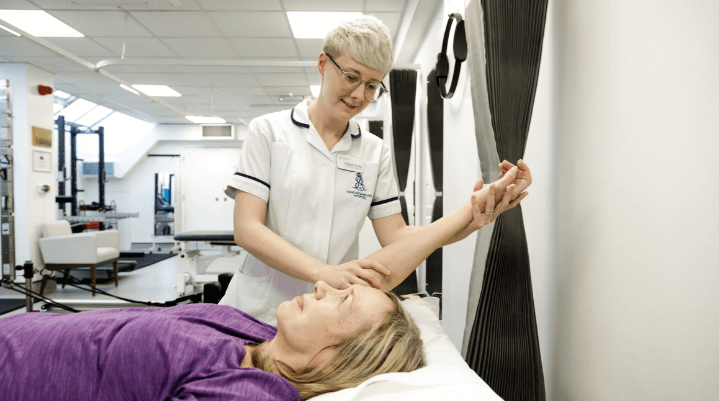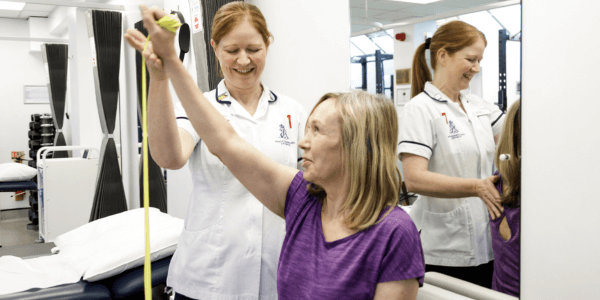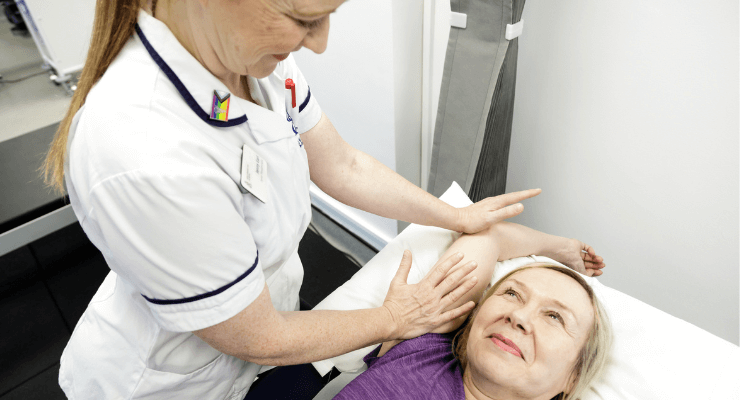How physiotherapy can help you after breast surgery

After breast surgery it can feel quite confusing finding out what is the best to help your recovery. You have so much to think about after surgery that it can be tricky to know where to start and what advice to follow.
One key thing to look at is preventing or managing mobility problems that can occur in your arms and shoulders, as well as looking at the problems that can be caused by tight scarring. We spoke to Specialist Physiotherapist for King Edward VII’s Hospital, Jenny Earl, about the benefits of physiotherapy after breast cancer surgery.
Why might I need physio after surgery for breast cancer?
Physiotherapy can help to prevent long term problems with shoulder movement, posture and lymphoedema and can help to support your return to your normal activities and sport. It can also help to relieve discomfort caused by tight scarring, and the formation of tight, rope-like structures called cording.
Issues from a lack of shoulder movement
Breast surgery can lead to a lack of shoulder movement, which in turn, can lead to stiffness, pain and weakness in the joint and arm.
Sessions of physiotherapy, started postoperatively when you’re recovering on the ward, will help to maintain circulation and provide nutrition to the area, preventing a shortening and weakness in the surrounding muscles.
How does physio help?
Physiotherapy sessions include a range of exercises designed to increase your range of movement, and it’s a very individualised approach. Each patient is different, with differences in lifestyle, starting point and surgery. You may also have an increased risk of shoulder problems following surgery if you already had stiffness or pain in your shoulder.
For these reasons, physiotherapy is very patient-centred and individual. It normally begins with very low level, below shoulder height exercises. Depending on how you’re healing, as an outpatient and when you’re safe to progress, you will then move to an increased level of movement to support your return to general exercise.
Exercise is important for your general health and wellbeing, and your physiotherapist will find a way to incorporate exercise into your recovery, completely at your own pace.
Once you’ve regained or maintained a range of movement within your shoulder, your physio will introduce strength exercise to aid your return to full function.

What is cording and how is it treated?
Cording is a form of tight scarring that causes tightness in the under arms and can develop as a side effect following breast cancer surgery, especially if you’ve had surgery to your lymph nodes.
If you develop cording, you’ll see or feel thin rope-like structures forming under the skin of the inner arm, often starting near the site of your surgical scars in the underarm region. Cording can cause pain and discomfort and limit your range of movement, and can reach down the arm towards the wrist or down into the chest area.
If you have cording following surgery, you may find it difficult to reach the upper arm positions required for radiotherapy.
It’s not yet fully understood what causes cording, and it’s uncertain on an individual basis if and how many may develop, but physiotherapy can help you regain your freedom of movement. Cording may develop days, weeks or even months following your surgery, and gentle massage techniques combined with gentle guided movements (rather than avoiding activity) can be beneficial.
Massage techniques and manual therapy can also be useful for treating surgical scars that might be sticking to other tissues causing tightness. These therapies can also be useful for helping you manage any apprehension or fear when using your arms following surgery.
More information
- The Breast Unit at King Edward VII’s Hospital has clinical nurse specialists, breast care nurse specialists, consultant radiologists, psychologists, pain and comfort management specialists, holistic healing partners and physiotherapists offering before and after surgery treatments.
- We offer breast screening, breast cancer treatment, breast reconstruction, nipple micropigmentation, physiotherapy for breast cancer related frozen shoulders and cording and genetic screening.
- We also offer all inclusive breast screening packages for those under 40 years old and 40+ years old.
- Our specialist Breast Therapy Service are available to book directly without a referral. You don’t have to have had your treatment with us to book sessions with them










